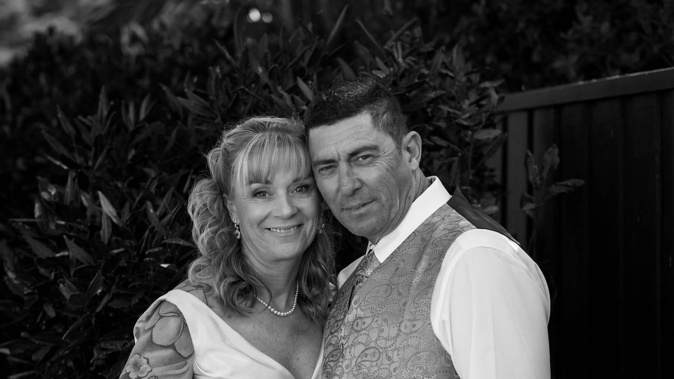
After battling lung cancer and two brain tumours, Christchurch mum Kiri Carter has been told the one drug keeping her alive will no longer be funded.
The 57-year-old met her husband, Kevin seven years ago. When the pandemic hit, Carter suffered from what doctors initially thought was Long Covid.
“That wasn’t Long Covid though. It was lung cancer, stage four,” she said.
“The doctors basically said we can’t treat you, see ya later.”
Two months later, Kevin and Kiri got married.
After receiving a terminal cancer diagnosis, Kiri and Kevin Carter got married. Photo / Dolce Wedding Photography
“Well, I was given six to nine months by the hospital … we thought we’d better get onto it,” Carter said.
Newly wed with two older children and three young grandchildren to watch over, Carter was determined to stay alive.
When the hospital told her she couldn’t be treated, she approached St George’s Private Hospital.
“I saw an oncologist there, a brilliant one called Raj, and he says, ‘now I can help you extend your life by giving you pemetrexed, but it’s going to cost $70,000′,” Carter said.
After extensive fundraising and taking out an early family inheritance, Carter managed to get the treatment. Not long after that, she began experiencing symptoms with her head, too.
“I got really sick, I was walking into door frames … so my husband took me into the emergency department,” she said.
“I told them you’ve got to look at my head there’s something wrong.”
The doctors found a brain tumour. A few days later, she had brain surgery. And a few days after that, she had to go under the knife again.
“The surgeon said, ‘Oh, we left half that behind … we have to do it again’,” she said.
 After battling lung cancer, Kiri Carter was diagnosed with brain cancer. Photo / Supplied
After battling lung cancer, Kiri Carter was diagnosed with brain cancer. Photo / Supplied
Fast forward to June this year, Kiri has been diagnosed with a second brain tumour. While awaiting a treatment plan to remove it, Pharmac told her it can no longer fund her drug - Pemetrexed.
According to its website, renewal of the drug is only administered if there has been “no evidence of disease progression”.
Despite the fact the drug is keeping her alive, the company has deemed Carter ineligible due to her brain tumours.
Fortunately, Carter met Johanna Tawharu.
 Johanna Tawharu and Kiri Carter met on the neurology ward in Christchurch hospital and were friends instantly. Photo / Supplied
Johanna Tawharu and Kiri Carter met on the neurology ward in Christchurch hospital and were friends instantly. Photo / Supplied
“I remember the first moment I met Kiri, it was pretty cool, we met in the neurology ward in hospital,” Tawharu said.
“I said what you in for … she laughed and said, ‘Oh I’ve actually got a tumour in my skull’,” Tawharu said.
“She was just so casual about it, I didn’t quite know what to say.
“Just that one conversation changed my whole life.”
Tawharu wasn’t in a good place when she met Carter. She had been in and out of surgery for a spinal injury.
“I really thought that I was in my lowest space, until I met Kiri.”
 Kiri Carter was given six-to-nine months to live, two years later, she is still fighting. Photo / Supplied
Kiri Carter was given six-to-nine months to live, two years later, she is still fighting. Photo / Supplied
Carter and Tawharu were friends instantly. Tawharu was “gutted” by Pharmac’s response.
“I think Pharmac has a responsibility. I mean, they are a multi-billion-dollar corporation ... why should they get to deem who lives and who dies,” she said.
Tawharu has since set up a Givealittle to “give Kiri the gift of time”.
“I started it because I wanted more time with her, but I also wanted her to have more time with her family,” she said.
“She gets up every day, she gardens, she cooks, she bakes, she cleans and she’s stopping to vomit because she’s sick, you know?
“This woman, she doesn’t want to waste any time.”
On July 3, Carter had her final round of radiation.
 Kiri Carter received her final round of radiation on July 3. Photo / Supplied
Kiri Carter received her final round of radiation on July 3. Photo / Supplied
“We are keeping our fingers and toes crossed for Kiri’s radiation treatment to work and kill off that ugly brain tumour,” Tawharu said.
“Keep being you Kiri. You have so many people who care about you, who are following your journey and sending you well wishes.”
Carter feels Pharmac’s decision to pull funding was premature. She said wasn’t sure the brain tumours were related to the lung cancer pemetrexed was treating in the first place.
Pharmac responded to Herald questions, saying that every eight months, if a clinician determines that an individual’s cancer has progressed, they are no longer eligible to receive treatment.
“We know it’s very difficult to manage a life-changing condition such as lung cancer and that access to medicines is a very important part of treatment,” a Pharmac spokesperson said.
“Pharmac has to make difficult decisions about what treatments are funded and for who, and to do that we rely on the best available clinical evidence and assessment, as well as understanding the day-to-day reality of what it’s like to live with health conditions.
“Pharmac sets eligibility criteria for medicines to help make sure we target funded treatments to those most likely to benefit. Our eligibility criteria are based off the clinical advice we receive and the evidence available to us.”
Carter felt the agency could have used a more empathetic response.
“It’s like people telling you you’re not worth saving,” she said.
In spite of her terminal diagnosis, and no treatment funding, Carter remains calm and positive.
“I don’t tend to stress out too much, because, you know, you deal with worse things, it doesn’t help my health if I’m going to stress out,” she said with a laugh.
- NZ Herald
Take your Radio, Podcasts and Music with you









